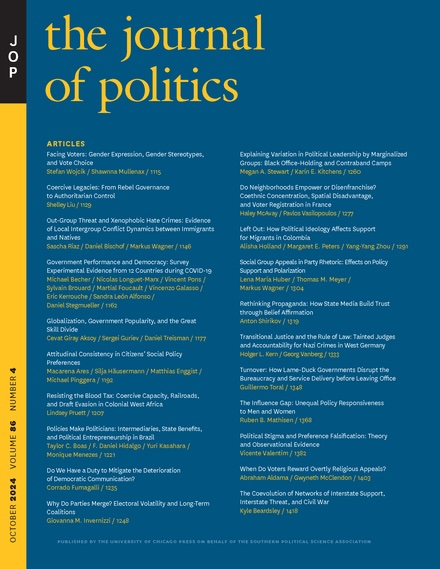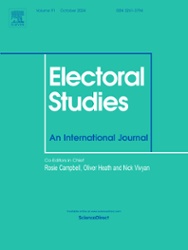Peer-Reviewed Publications

Haas, V. I., Bogatyrev, K., Klüver, H., & Stoetzer, L. F. (2025). The Electoral Effects of State-Sponsored Anti-LGBTQ Measures. Accepted at The Journal of Politics.
Abstract: Do strategies of state-sponsored homophobia translate into electoral gains? While a growing body of literature documents the increasing politicization of LGBTQ- and gender-related issues by illiberal elites, little is known about the electoral effects of these strategies. We address this important question by studying whether anti-LGBTQ mobilization pays off electorally for government parties. Empirically, we study the adoption of anti-LGBTQ resolutions in many Polish municipalities prior to the 2019 parliamentary election. Using a synthetic difference-in-differences design, we find that these resolutions significantly depressed turnout in affected municipalities, with opposition parties showing less mobilization capacity. By contrast, turnout for the incumbent Law and Justice Party increased. Overall, this study's findings are relevant for understanding the electoral consequences of both elite-led mobilization against stigmatized and discriminated groups and policies of subnational democratic backsliding.

Haas, V. I., Stoetzer, L. F., Schleiter, P., & Klüver, H. (2023). Can wedge strategies by mainstream parties cross-cut the anti-immigration far right vote? Electoral Studies, 83, 102617.
Abstract: Anti-immigration campaigns have helped far-right parties to establish themselves in party systems around the world. We examine whether mainstream parties can employ wedge issue campaigns that divide the far-right anti-immigration vote to win back electoral support. Wedge issues that cross-cut the anti-immigration vote may enhance the electoral support of mainstream parties, as long as they do not simultaneously alienate pro-immigration voters. We evaluate this expectation using a panel survey experiment conducted during the 2021 German federal election. The first wave allows us to identify wedge issues that the mainstream CDU/CSU can stress to cross-cut the anti-immigration vote. The second wave raises the salience of these issues by manipulating the perceived issue agenda of the CDU/CSU using hypothetical campaign posters. While our results show that wedge issue strategies are not effective on average, exploratory analyses reveal the potential of strategically targeted messaging in winning back support of some anti-immigration voters.
Working Papers
Panic at the Courtroom: Can Legislative Action against Discrimination in Court Reduce Hate Crimes?
Job Market Paper, Draft available upon request
Abstract: Can legislative measures against discrimination in court reduce bias-motivated behavior? This study examines the impact of criminal code reforms that prohibit the LGBTQ+ “panic” defense, a legal strategy that attributes a defendant’s violent actions to a victim’s sexual orientation or gender identity, on the incidence of hate crimes. I argue that such reforms operate through two mechanisms: first, by increasing the material costs of engaging in bias-motivated violence through heightened legal sanctions, and second, by signaling institutional disapproval of violence as a means of enforcing heteronormative and masculinist norms. To assess the causal effect of these reforms, I exploit the staggered adoption of LGBTQ+ “panic” defense bans across US states and employ a difference-in-differences design. The findings indicate that states implementing bans experience a significant reduction in anti-LGBTQ+ hate crimes. This study advances scholarship on minority rights, policy feedback, and the criminal justice system by demonstrating how legal reforms shape social norms and constrain bias-driven violence. The results also have direct implications for policymakers and advocates seeking to mitigate hate crimes through judicial and legislative interventions.
The Police as Gatekeepers of Information: Immigration Salience and Selective Crime Reporting
– with Ashrakat Elshehawy, Arun Frey, Tobias Roemer, Sascha Riaz –
Download Working Paper
Under Review
Abstract: What drives the supply of crime news? While prior research focuses on the news media, we study a crucial upstream gatekeeper of information: the police. We argue that the police act as strategic bureaucrats who increase the disclosure of out-group cues (ethnicity, nationality) when immigration is salient to signal competence and transparency to the public. To test this, we use LLMs to annotate a novel dataset of about one million press releases published by local police stations across Germany between 2014 and 2024. Using a regression discontinuity in time design, we demonstrate an increase in out-group cues in police communications (1) following a nationwide shock to immigration salience (the 2015/16 Cologne New Year’s Eve assaults), and (2) in the days before regional elections in which immigration is a salient campaign issue. Our findings demonstrate how bureaucratic discretion shapes the supply of politically charged information.
Beyond Persuasion: Protest’s Direct Behavioral Impact on Bystanders
– with Daniel Bischof, Ferdinand Geissler, Johannes Giesecke, Felix Hartmann, Macartan Humphreys, Heike Klüver, Lukas Stoetzer, and Tim Wappenhans –
Download Working Paper
Under Review
Abstract: Despite decades of scholarship on protest effects, we know little about how bystanders, citizens who observe protests without participating, are affected by them. Understanding the impact of protest on bystanders is crucial as they constitute a growing audience whose latent support, normative beliefs, and concrete actions can make or break a movement’s broader societal impact. To credibly assess the effects of protests on observers, we design and implement a field experiment in Berlin in which we randomly route pedestrians past (treatment) or away from (control) three large-scale Fridays for Future (FFF) climate strikes. Using data gathered on protest days as well as through a one-month follow-up survey, we find evidence for a substantial increase in immediate donations to climate causes but no detectable impact on climate attitudes, vote intentions, or norm perceptions. Our findings challenge the prevailing assumption in both scholarship and public discourse that protest effects operate via impacts on public opinion and call for renewed theorizing that centers on observers’ immediate behavioral activation.
How Good Ancestors Make Good Citizens: Norm Legacies and the Activation of Pro-Social Behavior
– with Mirko Wegemann –
Registered Report
Abstract: Collective memories shape behavior across generations, influencing how groups understand their place in and obligations toward society. Research on collective memories emphasizes histories of victimization, overlooking how positive historical examples of in-group practices guide contemporary behavior. We introduce the concept of norm legacies: historically rooted group practices that retain normative force across generations. Norm legacies operate when in-group achievements are remembered not just as historical facts but as meaningful benchmarks for present-day behavior. We propose two mechanisms: collective pride, enhancing group-based self-esteem, and group consistency, creating a desire to uphold the group’s positive identity. We test our argument across two survey experiments. Study 1 activates American Catholics’ memory of their church’s role in the labor movement; Study 2 highlights East Germans’ pioneering role in recycling. Compared to non-historical, in-group accounts of the targeted behavior (control), we expect exposure to norm legacies (treatment) to increase targeted attitudes and behaviors among in-group members. By advancing the concept of norm legacies, we offer a new micro-foundation for theories of cultural transmission and identify a durable, identity-based pathway that explains the persistence of pro-social behavior vital for democracy.
Selected Work in Progress
Signs of Belonging: Measuring Group Segregation and Contact in Space using AI
Grant awarded by the Institute for Humane Studies (IHS) at George Mason University, Cosmos x IHS AI-Accelerated Scholarship Program
Same in all but Name? Parallel Institutions in Present-Day Democracies
Electoral Responses to Local Cooperations with Radical-Right Parties
– with Phillip Heyna, Hanno Hilbig, Tim Wappenhans –